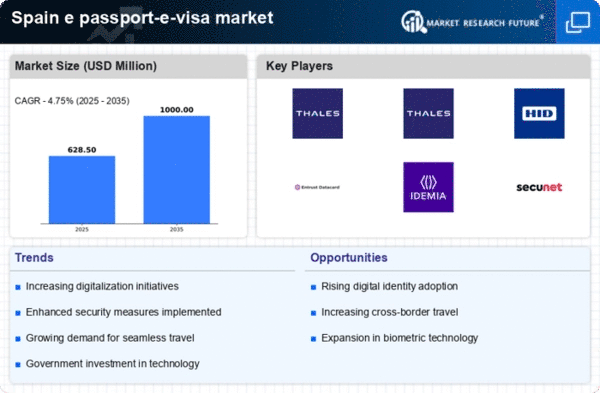Rising Security Concerns
the e passport-e-visa market is experiencing growth due to increasing security concerns among travelers and governments.. With the rise in global terrorism and identity fraud, there is a pressing need for secure travel documents. The implementation of biometric features in e passports enhances security, making it difficult for counterfeiters to replicate. In 2025, it is estimated that 70% of new passports issued in Spain will incorporate biometric technology. This trend not only boosts traveler confidence but also aligns with international standards, thereby facilitating smoother border control processes. As a result, the e passport-e-visa market is likely to expand as more individuals seek secure travel options.
Enhanced Travel Experience
The e passport-e-visa market in Spain is significantly influenced by the demand for an enhanced travel experience. Travelers increasingly prefer seamless and efficient processes, which e passports and e-visas can provide. The integration of digital solutions allows for quicker processing times at airports and border controls, reducing wait times. In 2025, it is projected that the adoption of e-visas will increase by 40% in Spain, as travelers seek convenience and efficiency. This shift not only benefits travelers but also streamlines operations for immigration authorities, indicating a mutual advantage that propels the e passport-e-visa market forward.
International Travel Resurgence
The e passport-e-visa market in Spain is poised for growth as international travel continues to rebound. With Spain being a popular tourist destination, the demand for efficient travel documentation is on the rise. In 2025, it is anticipated that international arrivals in Spain will increase by 25%, leading to a higher demand for e passports and e-visas. This resurgence in travel is likely to encourage the government to enhance its digital infrastructure, thereby promoting the e passport-e-visa market. The ability to process a larger volume of travelers efficiently will be crucial in maintaining Spain's position as a leading travel hub.
Regulatory Compliance and Standardization
The e passport-e-visa market in Spain is significantly shaped by regulatory compliance and the push for standardization in travel documentation. The European Union has established guidelines that member states must follow, which include the adoption of biometric passports and standardized visa processes. As Spain aligns with these regulations, the market for e passports and e-visas is expected to grow. In 2025, compliance with EU regulations is projected to drive a 30% increase in the issuance of e passports. This standardization not only enhances security but also facilitates easier travel across borders, thereby benefiting the e passport-e-visa market.
Technological Integration in Government Services
The e passport-e-visa market in Spain is being propelled by the integration of advanced technologies in government services. The Spanish government is investing in digital transformation initiatives aimed at modernizing public services, including immigration and border control. The introduction of artificial intelligence and machine learning in processing e visas is expected to improve efficiency and accuracy. By 2025, it is estimated that 50% of visa applications will be processed through automated systems, significantly impacting the e passport-e-visa market. This technological integration not only enhances service delivery but also positions Spain as a leader in adopting innovative solutions in travel documentation.
















